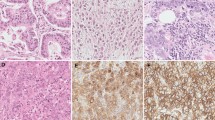Abstract
The clinical significance of CXCR4 expression in colorectal cancer remains unclear. The aim of this study was to investigate the expression and regulatory effects of CXCR4 in colorectal cancer and the association between CXCR4 protein expression and prognosis. The mRNA and protein expression levels of CXCR4 were determined using reverse-transcriptase polymerase chain reaction and immunohistochemistry staining, respectively, and the relationship between the CXCR4 protein level and clinicopathological parameters was analyzed in 720 cases of colorectal cancer. CXCR4 expression was elevated in colorectal cancer tissues compared to pericancerous tissues (P = 0.001). Of the 720 enrolled cases, 208 (28.89 %) expressed CXCR4. In univariate analysis, CXCR4 was found to be associated with lymph node metastasis, TNM stage, and liver metastasis (P = 0.001, 0.001, and 0.012, respectively). Further multivariate analysis suggested that histological grade, TNM stage, and CXCR4 expression were related to liver metastasis (P = 0.020, 0.01, and 0.001, respectively). In the Cox regression test, the histological grade, lymph node metastasis, TNM stage, liver metastasis, and CXCR4 expression were found to be independent prognostic factors (P = 0.02, 0.045, 0.01, 0.001, and 0.001, respectively). CXCR4 protein may be a potential biomarker for liver metastasis and an independent marker for survival in colorectal cancer.



Similar content being viewed by others
References
Broadbridge VT, Karapetis CS, Beeke C, Woodman RJ, Padbury R, Maddern G, et al. Do metastatic colorectal cancer patients who present with late relapse after curative surgery have a better survival? Br J Cancer. 2013;109(5):1338–43.
Reames BN, Krell RW, Ponto SN, Wong SL. Critical evaluation of oncology clinical practice guidelines. J Clin Oncol. 2013;31(20):2563–8.
Deo SV, Kapali AS, Gupta M, Shukla NK. A review of controversies in the management of colorectal cancers. Indian J Surg. 2012;74(3):221–7.
Hyder O, Dodson RM, Mayo SC, Schneider EB, Weiss MJ, Herman JM, et al. Post-treatment surveillance of patients with colorectal cancer with surgically treated liver metastases. Surgery. 2013;154(2):256–65.
Eichler K, Dufas T, Hammerstingl R, Gruber-Rouh T, Vogl TJ, Zangos S. Hepatic arterial infusion with irinotecan in patients with liver metastases of colorectal cancer: results of an extended phase I study. Chemotherapy. 2013;59(1):66–73.
Bullock MD, Bruce A, Sreekumar R, Curtis N, Cheung T, Reading I, et al. FOXO3 expression during colorectal cancer progression: biomarker potential reflects a tumour suppressor role. Br J Cancer. 2013;109(2):387–94.
Moriuchi M, Moriuchi H, Turner W, Fauci AS. Cloning and analysis of the promoter region of CXCR4, a coreceptor for HIV-1 entry. J Immunol. 1997;159(9):4322–9.
Caruz A, Samsom M, Alonso JM, Alcami J, Baleux F, Virelizier JL, et al. Genomic organization and promoter characterization of human CXCR4 gene. FEBS Lett. 1998;426(2):271–8.
He H, Wang C, Shen Z, Fang Y, Wang X, Chen W, et al. Upregulated expression of C-x-C chemokine receptor 4 is an independent prognostic predictor for patients with gastric cancer. PLoS One. 2013;8(8):e71864.
Qu QX, Huang Q, Xu J, Duan LT, Zhu YB, Zhang XG. CD40 signal regulates CXCR4 mediating ovarian carcinoma cell migration: implications for extrapelvic metastastic factors. Oncol Res. 2013;20(9):383–92.
Kremer KN, Peterson KL, Schneider PA, Meng XW, Dai H, Hess AD, et al. CXCR4 chemokine receptor signaling induces apoptosis in acute myeloid leukemia cells via regulation of the Bcl-2 family members Bcl-XL, Noxa, and Bak. J Biol Chem. 2013;288(32):22899–914.
Zhang HW, Sun XF, He YN, Li JT, Guo XH, Liu H. Bioinformatics analysis of breast cancer bone metastasis related gene-CXCR4. Asian Pac J Trop Med. 2013;6(9):732–8.
Gillies K, Wertman J, Charette N, Dupré DJ. Anterograde trafficking of CXCR4 and CCR2 receptors in a prostate cancer cell line. Cell Physiol Biochem. 2013;32(1):74–85.
Strong VE, D'Amico TA, Kleinberg L, Ajani J. Impact of the 7th edition AJCC staging classification on the NCCN clinical practice guidelines in oncology for gastric and esophageal cancers. J Natl Compr Canc Netw. 2013;11(1):60–6.
Abou-Bakr AA, Elbasmi A. c-MET overexpression as a prognostic biomarker in colorectal adenocarcinoma. Gulf J Oncolog. 2013;1(14):28–34.
Luo DH, Chen QY, Liu H, Xu LH, Zhang HZ, Zhang L, et al. The independent, unfavorable prognostic factors endothelin A receptor and chemokine receptor 4 have a close relationship in promoting the motility of nasopharyngeal carcinoma cells via the activation of AKT and MAPK pathways. J Transl Med. 2013;11(1):203.
Segawa Y, Oda Y, Yamamoto H, Shiratsuchi H, Hirakawa N, Komune S, et al. Close correlation between CXCR4 and VEGF expression and their prognostic implications in nasopharyngeal carcinoma. Oncol Rep. 2009;21(5):1197–202.
Acknowledgments
This study was supported by grants from the National Natural Science Foundation of China (No:30973502) and Liaoning Provincial Science and technology plan program(No:2012225072).
Conflicts of interest
None.
Author information
Authors and Affiliations
Corresponding author
Rights and permissions
About this article
Cite this article
Gao, Y., Li, C., Nie, M. et al. CXCR4 as a novel predictive biomarker for metastasis and poor prognosis in colorectal cancer. Tumor Biol. 35, 4171–4175 (2014). https://doi.org/10.1007/s13277-013-1545-x
Received:
Accepted:
Published:
Issue Date:
DOI: https://doi.org/10.1007/s13277-013-1545-x




